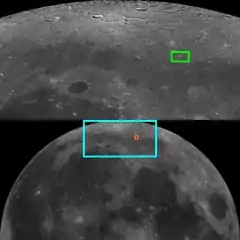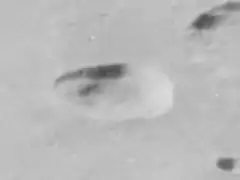Sheepshanks (crater)
Sheepshanks is a small lunar impact crater located near the northern edge of Mare Frigoris. Due south on the opposite shore is the prominent crater Aristoteles while to the north is C. Mayer. Sheepshanks appears somewhat oblong due to foreshortening, but it is actually nearly circular. The inner walls slope down to a ring of material around the inner floor. There is a small craterlet along the southeastern inner wall. The crater is otherwise not particularly eroded by impacts.
 Location of the lunar crater Sheepshanks. | |
| Coordinates | 59.2°N 16.9°E |
|---|---|
| Diameter | 25 km |
| Depth | 2.0 km |
| Colongitude | 17° at sunrise |
| Eponym | Anne Sheepshanks |

About 30 kilometres (19 mi) to the southeast of the crater rim is the western end of the narrow rille named Rima Sheepshanks. This cleft extends for a distance of about 200 kilometres (120 mi) across the surface of the mare, running to the east-northeast.
The craters are named for Anne Sheepshanks who was a benefactor to the Royal Astronomical Society. Despite being overlooked for membership of the society her contribution is recorded in the naming of these craters.[1]
Satellite craters
By convention these features are identified on lunar maps by placing the letter on the side of the crater midpoint that is closest to Sheepshanks.
| Sheepshanks | Latitude | Longitude | Diameter |
|---|---|---|---|
| A | 60.0° N | 19.0° E | 7 km |
| B | 60.3° N | 21.1° E | 5 km |
| C | 57.0° N | 18.1° E | 11 km |
References
- 100 years and counting: women in the RAS go from strength to strength, 14 January 2016, RAS, Retrieved 16 March 2017
- Andersson, L. E.; Whitaker, E. A. (1982). NASA Catalogue of Lunar Nomenclature. NASA RP-1097.
- Blue, Jennifer (July 25, 2007). "Gazetteer of Planetary Nomenclature". USGS. Retrieved 2007-08-05.
- Bussey, B.; Spudis, P. (2004). The Clementine Atlas of the Moon. New York: Cambridge University Press. ISBN 978-0-521-81528-4.
- Cocks, Elijah E.; Cocks, Josiah C. (1995). Who's Who on the Moon: A Biographical Dictionary of Lunar Nomenclature. Tudor Publishers. ISBN 978-0-936389-27-1.
- McDowell, Jonathan (July 15, 2007). "Lunar Nomenclature". Jonathan's Space Report. Retrieved 2007-10-24.
- Menzel, D. H.; Minnaert, M.; Levin, B.; Dollfus, A.; Bell, B. (1971). "Report on Lunar Nomenclature by the Working Group of Commission 17 of the IAU". Space Science Reviews. 12 (2): 136–186. Bibcode:1971SSRv...12..136M. doi:10.1007/BF00171763. S2CID 122125855.
- Moore, Patrick (2001). On the Moon. Sterling Publishing Co. ISBN 978-0-304-35469-6.
- Price, Fred W. (1988). The Moon Observer's Handbook. Cambridge University Press. ISBN 978-0-521-33500-3.
- Rükl, Antonín (1990). Atlas of the Moon. Kalmbach Books. ISBN 978-0-913135-17-4.
- Webb, Rev. T. W. (1962). Celestial Objects for Common Telescopes (6th revised ed.). Dover. ISBN 978-0-486-20917-3.
- Whitaker, Ewen A. (1999). Mapping and Naming the Moon. Cambridge University Press. ISBN 978-0-521-62248-6.
- Wlasuk, Peter T. (2000). Observing the Moon. Springer. ISBN 978-1-85233-193-1.